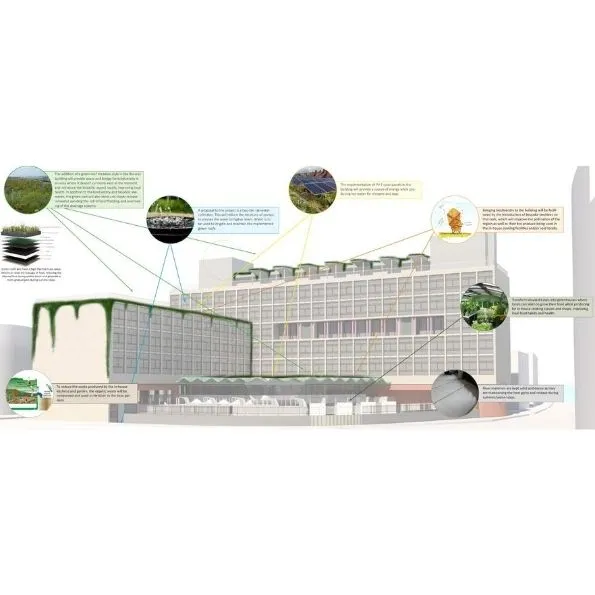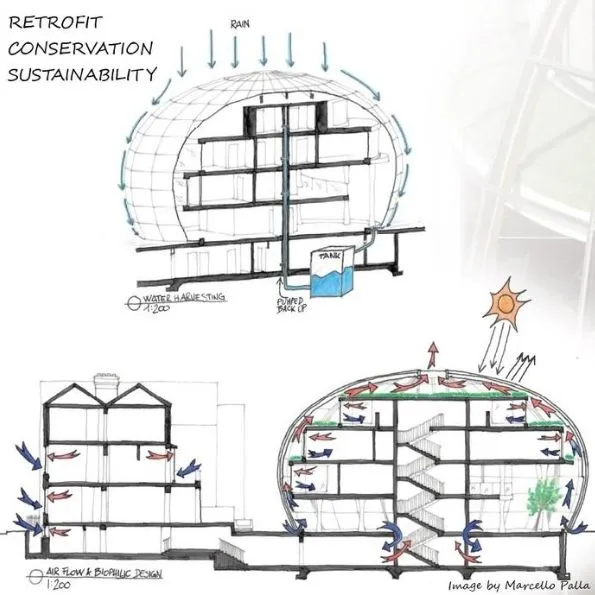Diploma in Conservation, Sustainability & Adaptive Reuse

Course Overview
This diploma helps you to consider environmental sustainability within design, architecture, and more industries.
The Diploma in Conservation, Sustainability & Adaptive Reuse addresses the increased awareness among practitioners in the design, architecture, conservation and indeed the wider built environment community of a need for environmental sustainability. The programme introduces simple immediate measures that can be adopted by conservators to reduce the environmental impact of their practice.
The learner will be introduced to environmental sustainability policies as a guideline and will be shown how these measures are presented in the form of benchmarks to introduce steps that can be followed to achieve best practices.
This unique skill set will allow learners to innovatively and creatively redesign and re-imagine existing buildings with a high standard of technical competence.
The course pays particular attention to developing the learner’s knowledge of health & safety protocols in line with Irish legislation. Learners will also develop an advanced understanding of building control demands including accessibility requirements, environmentally sustainable design, conservation and safe project delivery.
Why study Conservation, Sustainability & Adaptive Reuse with Griffith College?
In today’s climate, there is a continued focus on developing sustainable approaches to working, and the construction industry is not exempt from this. As such, conservation projects are becoming more common meaning there is an increased need for trained retrofit professionals, whose unique skillset and expert knowledge can be used to encourage more effective use of the existing built landscape. Not only that, but regular changes in legislation relating to the built environment are placing higher demands on professionals within the industry to remain informed of best practices, particularly in relation to health and safety.
The programme is delivered through a mixture of online lectures and on-campus workshops, which take place in the evenings/at weekends to allow for minimal disruption to the working day. Other reasons to consider this course include:
- Learners will gain advanced knowledge and understanding of how to adhere to Irish legislation and legislative change, including building laws and statutory instruments, building regulations (fire safety and disability access), building control and associated theory, sustainability (including BER auditing) and the Construction Products Directive.
- Learners have the opportunity to specialise/gain unique skills that can be implemented in a range of innovative, highly advanced and therefore sought-after projects.
- The course has been developed with input from a wide range of disciplines within the construction sector.
- Learners will develop transferable skills that may open them up to broader, international job opportunities.
- The course is managed by Griffith’s long-standing Design Faculty and is delivered by experts from the industry.
- The combination of a mixture of online and on-campus lectures allows for minimal disruption to the normal working day.
The Certificate in Retrofit, Conservation and Sustainability is an embedded special purpose award in this programme. Learners on this programme who complete the 30 ECTS may choose to exit with the embedded award.
Course Highlights
- Designed to meet the skills required by industry
- Provides a solid base for those looking to advance their knowledge of Conservation, Sustainability & Adaptive Reuse
- Develops learner’s understanding of legislation in relation to conservation
- Flexible study mode to allow minimal disruption to working day
- Friendly, approachable staff (who are experts in their fields), provide a supportive learning environment
- Full access to Student Adobe Creative Cloud - All Apps plan, which gives you 20+ cutting-edge creative tools for desktop, mobile, and web
Intake Dates
- Dublin - Part-Time - September 2026
- Dublin - Part-Time - February 2027
Course Details
Course Modules
This module develops learners' understanding of conservation as a specialist element and facilitates their incorporation of this concept in their project work as appropriate. The module supports the learner’s capability to make informed choices concerning the most current conservation strategies for specific projects, and understand one’s own limitations and the requirement to engage external specialised knowledge on a project. Learners will also develop the ability to formulate a conservation condition survey and report.
This module enables the learner to understand sustainability as a necessary element within the built environment and implement this concept in their project work. Learners are introduced to the concept of sustainability and its role in the design, construction and use of the built environment. The concept is further developed to consider the wider context of climate change, energy sources and efficiencies, the circular economy, reduce/reuse/recycle strategies, and environmental ethics. Learners are encouraged to embrace sustainable design within the context of current legislation and regulations.
This module provides learners with an overview of the legal and statutory and associated requirements relevant to the built environment. While Irish law is the main context for the module, many aspects of European law are highlighted and discussed throughout, as relevant to the sector. Thus learners are provided with a comprehensive overview of the important aspects of law that affect building industry businesses in operation in Ireland and the European Union.
This module enables the learner to develop their knowledge of the philosophy and ethos behind conservation, covered in Conservation I. It facilitates the learner to formulate conservation strategies and appropriate approaches in their project work. The module supports the learners’ understanding of the context and appraisal of historic interiors and buildings, and the traditional materials and building techniques utilised within these structures. An awareness of health and safety considerations and the implications for new technologies and services in historic buildings is also engendered. The module also supports the learners’ continued development of specialised knowledge of selected technical applications of conservation and restoration of furniture and finishes.
This module further support the learner’s capacity to make informed choices concerning the most current sustainable strategies for built environment projects, by researching and evaluating. The module also enables the learner to formulate and implement a design strategy for sustainability, considering variables such as the building fabric; materials and furniture, interior finishes and palettes, building systems and services. The learner will understand when and how to implement sustainability, and use software to test the sustainability of their design. Topics such as renewable technologies, sustainability assessment, waste and water management and efficiency, will also be covered.
Course Contact

- Dublin Main Campus
Timetables
This course is scheduled to commence in September 2026 at Griffith College Dublin's Main Campus and Online via Zoom.
This part-time programme runs two evenings (Tuesdays & Thursdays) per week from 6.30 pm -9.45 pm and every second Saturday from 10.00 am - 5.00 pm for 1 year.
Year 2026
Timetables will be made available closer to the course start date.
Contact [email protected] for further information.
How to Apply
Entry Requirements
Applicants to the programme must meet normal QQI requirements, Level 7 or equivalent, award on the National Framework of Qualifications.
The applicants require a background in building design and construction-related programmes. CV showing relevant experience within the field is required.
English Language
If English is not your native language, you must show that your English level is of a suitable standard.
How to Apply
Applicants should apply directly to Griffith College.
Fees
For purposes of fee calculation, the residence is counted from the time of application.
Please note that not all study modes may be offered at all times; for confirmation, refer to the Intake dates on the Overview tab.
Tuition Fees
Study Mode: Part-Time
Dublin Main Campus: €4640.00
(Inclusive of Tuition Fee €4250.00, Academic Administration Fee €250.00, 2% Learner Protection Charge (€90.00) and €50.00 QQI Award fee)
General Fee Information
An Academic Administration Fee of EUR250.00, a 2% Learner Protection Charge and EUR50 QQI Award fee is applicable each academic year.
An Academic Administration Fee of €250 is payable each September at the start of term. For students starting in the January/February term, €125 is payable in February, and then €250 will be payable each September from then onwards
Direct Debit Scheme
Students wishing to pay for their fees monthly may avail of our direct debit scheme. Please view our Fees information page to review the payment plan schedule and how to apply.
Sponsorship
Is your company paying for your course?
They will need to complete a Griffith College Sponsorship Form and send this to the Student Fees Office:
- Post: Student Fees, Griffith College Dublin, South Circular Road, Dublin 8
- Email: [email protected]
2% Learner Protection Charge
All QQI accredited programmes of education and training of 3 months or longer duration are covered by arrangements under section 65 (4) of the Qualifications and Quality Assurance (Education and Training) Act 2012 whereby, in the event of the provider ceasing to provide the programme for any reason, enrolled learners may transfer to a similar programme at another provider, or, in the event that this is not practicable, the fees most recently paid will be refunded.
QQI Award Fee
Please note that a QQI Award Fee applies in the final year of all QQI courses. To find the relevant fee for your course level, please see the Fees page.
Progression
This course provides a pathway to Construction Management-related programmes.



